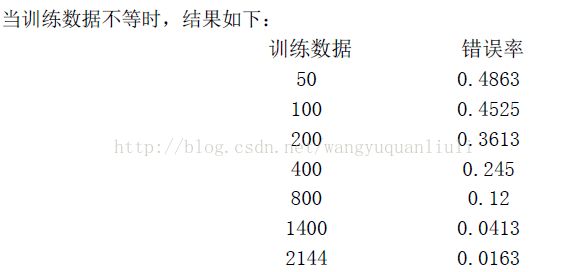朴素贝叶斯分类器 matlab,朴素贝叶斯实现垃圾邮件分类——matlab实现 | 学步园...
之所以用matlab实现,是因为这是数据挖掘课的几个大作业之一,作业要求,不然也不会这么蛋疼用matlab....(因为我不会matlab...)
朴素贝叶斯原理非常简单,最重要的就是概率公式:
下面贴用matlab的具体实现
train阶段:
[spmatrix, tokenlist, trainCategory] = readMatrix('MATRIX.TRAIN');
trainMatrix = full(spmatrix);
numTrainDocs = size(trainMatrix, 1);
numTokens = size(trainMatrix, 2);
% trainMatrix is now a (numTrainDocs x numTokens) matrix.
% Each row represents a unique document (email).
% The j-th column of the row $i$ represents the number of times the j-th
% token appeared in email $i$.
% tokenlist is a long string containing the list of all tokens (words).
% These tokens are easily known by position in the file TOKENS_LIST
% trainCategory is a (1 x numTrainDocs) vector containing the true
% classifications for the documents just read in. The i-th entry gives the
% correct class for the i-th email (which corresponds to the i-th row in
% the document word matrix).
% Spam documents are indicated as class 1, and non-spam as class 0.
% Note that for the SVM, you would want to convert these to +1 and -1.
% YOUR CODE HERE
positiveSize = length(find(trainCategory));
negitiveSize = length(trainCategory)-positiveSize;
p1 = positiveSize/numTrainDocs;
p0 = negitiveSize/numTrainDocs;
trainCategory = full(trainCategory);
trainMatrixResult1 = linspace(0,0,numTokens);
trainMatrixResult0 = linspace(0,0,numTokens);
for i=1:numTrainDocs
for j=1:numTokens
if abs(trainCategory(1,i)-1)<=1e-10
trainMatrixResult1(j) = trainMatrixResult1(j)+trainMatrix(i,j);
else
trainMatrixResult0(j) = trainMatrixResult0(j)+trainMatrix(i,j);
end
end
end
class1sum = sum(trainMatrixResult1);
class0sum = sum(trainMatrixResult0);
for i=1:numTokens
trainMatrixResult1(i) = 1000*trainMatrixResult1(i)/class1sum;
trainMatrixResult0(i) = 1000*trainMatrixResult0(i)/class0sum;
end
test阶段:
[spmatrix, tokenlist, category] = readMatrix('MATRIX.TEST');
testMatrix = full(spmatrix);
numTestDocs = size(testMatrix, 1);
numTokens = size(testMatrix, 2);
% Assume nb_train.m has just been executed, and all the parameters computed/needed
% by your classifier are in memory through that execution. You can also assume
% that the columns in the test set are arranged in exactly the same way as for the
% training set (i.e., the j-th column represents the same token in the test data
% matrix as in the original training data matrix).
% Write code below to classify each document in the test set (ie, each row
% in the current document word matrix) as 1 for SPAM and 0 for NON-SPAM.
% Construct the (numTestDocs x 1) vector 'output' such that the i-th entry
% of this vector is the predicted class (1/0) for the i-th email (i-th row
% in testMatrix) in the test set.
output = zeros(numTestDocs, 1);
%---------------
% YOUR CODE HERE
%---------------
for i=1:numTestDocs
belongTo1 = 1;
belongTo0 = 1;
for j=1:numTokens
if testMatrix(i,j) ~= 0
tokenIndex = j;
belongTo1 = belongTo1*trainMatrixResult1(tokenIndex);
belongTo0 = belongTo0*trainMatrixResult0(tokenIndex);
end
end
if belongTo1>belongTo0
output(i) = 1;
else
output(i) = 0;
end
end
% Compute the error on the test set
error=0;
for i=1:numTestDocs
if (category(i) ~= output(i))
error=error+1;
end
end
%Print out the classification error on the test set
error/numTestDocs
分类结果:
图形化展示:
请各位亲不要直接复制黏贴就交上去哦~


